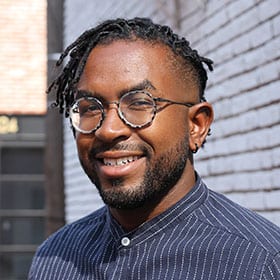Founder + Chief Strategist
&Access
FOCUS
Imagine the focal point of your favorite neighborhood. For Bobby, it’s Sweet Auburn Curb Market, located in the historic African-American neighborhood Martin Luther King, Jr. called home. Here you find all of Atlanta represented in the food, the people, and the boisterous experience. It is these kinds of memories that led Bobby to his passion for saving these community anchors. They help us celebrate the diversity of people and places and demonstrate that culture is a framework for health, well-being, and belonging that already exists in each neighborhood worldwide. He seeks to perpetuate this cultural value and neighborhood identity by providing increased opportunities to help launch and sustain minority-owned retailers and restaurants. In fact, underserved, low-income neighborhoods are already home to 43 percent of all small businesses. These businesses have significant potential to serve as the dominant image of a neighborhood’s culture, and its brand, serving nearby residents and attracting visitors.
Bobby imagines a world where adequate access to essential goods and services promotes walking/biking, develops social networks, and improves quality of life. He works daily to create solutions with community builders, including governmental agencies, community and real estate development organizations, and business support programs, and hopes to connect and collaborate with others who are also passionate about supporting those business owners providing essential goods and services to our beloved neighborhoods. He believes that by supporting these owners, they can make valuable contributions to helping youth realize their dreams are attainable, no matter how big.
STRATEGIC INITIATIVE: In Place: a Retail Preservation Accelerator
I love discovering the diversity of neighborhood businesses, from local coffee shops to international markets. In the U.S., many of these businesses exist in historically disinvested urban communities undergoing gentrification and lack control/ownership of the property. This condition is even more exacerbated for businesses owned by immigrants and people of color who face greater lending discrimination and landlord exploitation and who have less bargaining power than those with white-owned businesses. That’s why I’m launching “In place: a Retail Preservation Accelerator” as my strategic initiative. It is structured as a planning grant to create a fund that enables minority entrepreneurs to acquire and improve upon their properties. My goal with this fund is to provide direct capital investment to help them cross the equity thresholds needed to secure mortgages and make physical improvements. I believe the time is now to rectify past inequities for future generations, reframing the American dream of property ownership to the American reality that wealth generation is rooted in property, and diversified property ownership is a great opportunity for black people and people of color to remain in place.
MORE ABOUT BOBBY
Through his experience developing community solutions, Bobby recognized a need to challenge the traditional real estate system, which awards affluent communities with retail. In contrast, low-income neighborhoods and communities of color often remain underinvested until an opportunity arises to exploit the land for greater profit for others.
He started doing this work because of his passion for Black communities, which stems from growing up in Atlanta, attending an HBCU (Florida A&M University), and living and working in Washington, DC and Detroit, among other communities of color. This passion is compounded by his love for physical communities, primarily commercial environments, where he sees his educational background in architecture and urban planning come to life. Here, these commercial corridors, developments, and businesses are where the community intersects, integrating diverse people, perspectives, and products.
The independent storefront businesses are a keystone in the neighborhood fabric. Their owners and staff often interact with generations of residents, bridge institutions, and serve as gathering places for those new and old to the community. For example, one of Bobby’s favorite places is Tryst, a coffee shop, in DC’s Adams Morgan neighborhood known for its role in the community as a place to read a book, meet a friend for happy hour, or grab a key when checking in to an Airbnb nearby, among many other purposes.
To grow and sustain these businesses and communities, he launched &Access, a retail real estate and urban planning consultancy focused on historically excluded entrepreneurs and under-invested neighborhoods. Bobby seeks to sustain storefronts occupied by minority businesses because they truly can contribute to ingrained, culturally-rooted solutions.
Click here to watch Bobby’s Legacy Project video.
BOBBY’S WORK AND VISION

